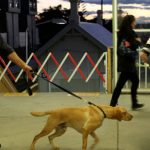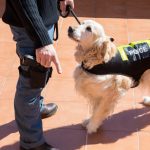The High Cost of NSW Sniffer Dog Operations

Recently released figures show taxpayers are forking out exorbitant amounts to fund the use of sniffer dogs at music festivals. And despite the evidence police searches increase dangerous drug use at these events, festivalgoers are now the main focus of NSW police drug detection dog operations.
The NSW Greens have estimated that the average cost of running three drug detection dogs at a festival is $6,000 an hour. These figures are based on NSW police standard operating procedures and cost-recovery rates.
This means that if an average festival runs for six hours, drug dog operations at an event are costing around $36,000. So, if police attend twenty festivals a year, it could be costing taxpayers in excess of $720,000 to fund operations.
And the expenditure at music festivals is on top of the $9,420,416 it costs on average each year to run the NSW police detection dog unit to conduct warrantless searches at train stations, licenced venues and on the street.
False indications
However, NSW police drug dog operations have been shown to be seriously flawed, as most of the time a dog makes an indication that an individual is in possession of illegal drugs, the subsequent search results in no illicit substances being found.
In 2011, 78 percent of searches conducted by police resulted in nothing being found. In 2014, police got it wrong 74 percent of the time. And the figures for the first six months of this year show that 60 percent of individuals subjected to an invasive search weren’t holding any drugs.
Ramping up enforcement at festivals
The latest figures also reveal that NSW police has recently begun backing off on its use of sniffer dogs. In 2011, police conducted 16,459 searches. But last year, the number of searches dramatically dropped to 9,497.
So, you might think taxpayers are beginning to save on some of that expenditure at music festivals. However, this isn’t the case.
NSW Greens MLC David Shoebridge is the man who’s been collating all these figures. He revealed to Sydney Criminal Lawyers® on Wednesday that music festivals have now become the major focus of police sniffer dog operations.
A breakdown of the search figures between January 1 and June 13 this year show that 1,324 searches were carried out in public transport locations, 1,344 were in licensed premises, only 623 were on streets, while the overwhelming majority, 1,701, were conducted at dance parties and festivals.
And according to Mr Shoebridge, these operations are more about their appearance, than proven effectiveness. “It’s all about PR. It’s not about finding drugs. It’s not about harm minimisation. It’s being seen to be doing something, when the rest of the war on drugs is so obviously failing.”
Drug dog dependency
NSW police began using sniffer dogs in the lead up to the 2000 Sydney Olympics. From early 2001, police began using drug detection dogs on public transport, licensed premises, nightclubs and on the street.
The regulations governing police use of sniffer dogs to conduct warrantless searches in public came into effect in February 2002, under the Police Powers (Drug Detection Dogs) Act. Since December 2005, these powers now fall under the Law Enforcement (Powers and Responsibilities) Act 2002.
The 2006 NSW Ombudsman report on drug detection dog operations revealed that prohibited drugs were only found in 26 percent of all searches, most of the drugs detected were small amounts of cannabis, and dogs were failing to detect drug dealers.
However, despite long-term criticisms, NSW continues to be the biggest user of drug dogs in the nation. “NSW police are addicted to drug dogs in a way that no other state or territory police force is,” Shoebridge declared. However, he pointed out that Victoria police are fast catching up.
A dangerous presence
Harm reduction experts have repeatedly pointed out that the presence of drug dogs at music festivals can actually cause attendees to partake in risky behaviours that can result in hospitalisation, overdose, and even death.
These practices include hiding illicit substances in internal body cavities in packages, such as condoms, as well as preloading, which is when an individual consumes all their drugs prior to an event in order to avoid police detection.
Panic overdosing is also a major concern. This is when a person takes all of their drugs at once on seeing a drug dog operation. The death of James Munro at Sydney’s Defqon 1 festival in 2013 is believed to have been a case of panic overdosing.
Mr Shoebridge proposes that due to the expense and ineffectiveness of drug dogs, the government should scrap the NSW program and invest in harm minimisation initiatives.
An approach that saves lives
Over recent years, there’s been a push to introduce pill testing trials at music festivals, which was sparked by six drug-related deaths at these events nationally during a 13 month period ending in December 2015. Since that time, preventable deaths have continued to occur at festivals.
Pill testing services are an evidence-based approach to drug use at festivals that many European nations have been utilising for decades. Festivalgoers are able to have illicit substances tested by laboratory equipment to ascertain whether their effects could be harmful.
The ACT government announced it would allow Australia’s first pill testing trial to take place at a festival in November. However, due to a last minute requirement to gain approval to hold the trial on land owned by the federal government, it was abandoned.
Mr Shoebridge believes the federal government was applying pressure to cancel the trial. He hopes that now the ACT government supports pill testing, the next festival is held on territory controlled land, so the federal government can’t “put its big size 12 boots in to stop the trial.”
Law enforcement is failing
However, the NSW government firmly shot down pill testing trial proposals last year. This is despite the growing support for these services at music festivals amongst health professionals and the community. “The police minister and the cabinet in NSW are a bunch of dinosaurs,” Shoebridge said.
The NSW Crime Commission Annual Report 2015-2016 outlines that although national law enforcement efforts have resulted in large drug seizures and arrests, they’ve had little “effect on the quantities of prohibited drugs available for consumption in Australia.”
An admission like this makes it clear that a different approach to drugs is necessary, Mr Shoebridge pointed out. “It’s definitely time politicians moved from the Jurassic Age to at least something acknowledging we’re warm-blooded mammals and we’re not going to get rid drugs








